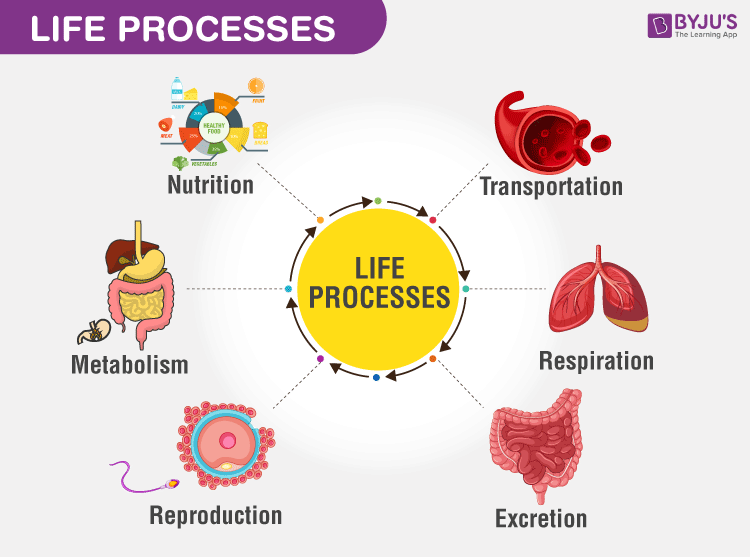
What are the 7 life processes
Life processes: These are the 7 processes all living things do – movement, reproduction, sensitivity, nutrition, excretion, respiration and growth. Animals: are one of a large group of living things that can move around by themselves to find food.
What are the processes of life
The basic processes of life include organization, metabolism, responsiveness, movements, and reproduction. In humans, who represent the most complex form of life, there are additional requirements such as growth, differentiation, respiration, digestion, and excretion.
Which are the important life processes in living organisms Class 10
Important life processes include nutrition, transportation, metabolism, respiration, reproduction and excretion, which help in the maintenance of living organisms.
What are the life processes in plants and animals grade 11
There are seven essential processes in common: movement, respiration, sensitivity, growth, reproduction, excretion and nutrition or MRS GREN.
Why are the 7 life processes important
Life processes are the series of actions that are essential to determine if an organism is alive – every single living thing known to humans performs these actions. The seven processes are both signs of life and vital for sustaining it.
Why do we need the 7 life processes
The seven processes are both signs of life and vital for sustaining it. While different living organisms may seem extremely different, or potentially seem not to be alive at all, as long as they perform all seven of the following processes, we can identify them as a living organism.
What are the 6 main human life processes
Even when you are not doing anything, your body keeps on functioning. There are six life processes that all living organisms perform. They are movement, respiration, growth, reproduction, excretion and nutrition.
What is life processes with examples
Life processes are the series of actions, such as movement, respiration, sensitivity, growth, reproduction, excretion and nutrition that are essential for a living being to sustain.
What is life processes in class 10 in definition and examples
Solution: ∙ Life processes include all the activities that an organism performs to survive in the environment. ∙ There are various activities of the living system that help an organism survive. This includes nutrition, respiration, circulation, excretion, movement, reproduction, development and sensation.
How many life processes do living organisms have
There are six life processes that all living organisms perform. They are movement, respiration, growth, reproduction, excretion and nutrition.
What are the 7 life processes of plants with examples
The seven life processes of plant life include movement, sensitivity, nutrition, excretion, respiration, reproduction and growth. Many plant life processes are similar to those of other living organisms, such as human beings and animals.
What are the 6 basic processes of life
Significant life processes are nutrition, transportation, metabolism, respiration, reproduction, and excretion.
Do all living things need all 7 characteristics of life
Big Ideas: All living things have certain traits in common: Cellular organization, the ability to reproduce, growth & development, energy use, homeostasis, response to their environment, and the ability to adapt. Living things will exhibit all of these traits.
What is a life process class 10
2) Life processes :- Life. processes are the basic processes in living organisms which are necessary for maintaining their life. The basic life processes are – nutrition, respiration, transportation, and excretion.
What are the 7 characteristics of living things biology
The seven characteristics what makes an organism living are: Environmental responses, cells, change and growth, reproduction, having complex chemistry, and homeostasis and energy processing.
What are the 6 levels of life in order
Life processes of the human body are maintained at several levels of structural organization. These include the chemical, cellular, tissue, organ, organ system, and the organism level.
Are there five 5 stages in the human life cycle *
IntroductionInfancy (neonate and up to one year age)Toddler ( one to five years of age)Childhood (three to eleven years old) – early childhood is from three to eight years old, and middle childhood is from nine to eleven years old.Adolescence or teenage (from 12 to 18 years old)Adulthood.
How many types of life processes are there
There are six life processes that all living organisms perform. They are movement, respiration, growth, reproduction, excretion and nutrition.
Which is the most important life process
Photosynthesis is the process by which green plants produce carbohydrates using carbon dioxide, and water in the presence of sunlight. This process can be termed as the most important life process in the ecosystem as it enables the conversion of light energy of the sun to chemical energy in the form of carbohydrates.
What are life processes Class 12
There are six life processes that all living organisms perform. They are movement, respiration, growth, reproduction, excretion and nutrition.
What is life process explanation in English
Life processes are the series of actions, such as movement, respiration, sensitivity, growth, reproduction, excretion and nutrition that are essential for a living being to sustain.
What are life processes in living organisms answers
The important life processes are nutrition, transportation, metabolism, reproduction, respiration, and excretion. All these processes work together and result in the growth and development of the body.
Which process is used by all living organisms
Respiration: It is the process where glucose is broken down to produce energy in the form of ATP. Respiration can be of three types depending on the availability of oxygen.
What are the 10 stages of plant life cycle
Plant Life Cycle:Plant life cycle describes the various stages of plant life.The main stages in the life cycle of a plant are seed germination, seedling formation, growth, development and differentiation leading to a mature plant, pollination and fertilisation and the formation of fruit and seeds.
Do plants have 7 life processes
The seven life processes of plant life include movement, sensitivity, nutrition, excretion, respiration, reproduction and growth. Many plant life processes are similar to those of other living organisms, such as human beings and animals.


